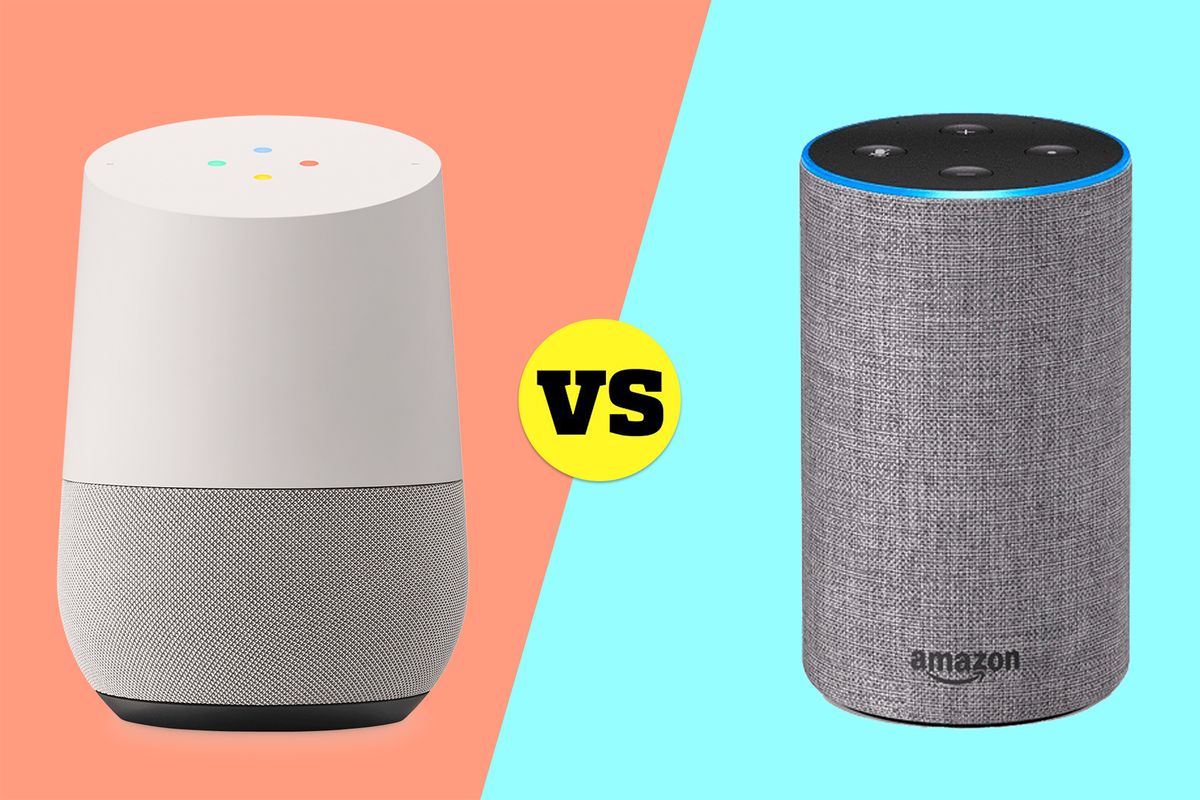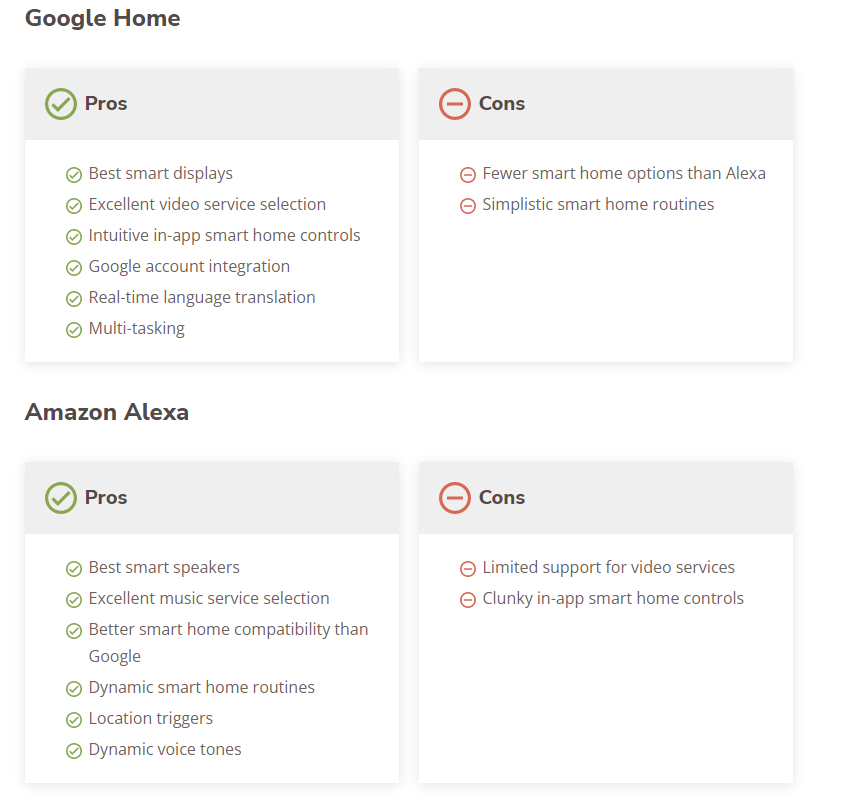Alexa vs Google Home

Alexa Vs Google Home
Of all the entry-level smart home devices on the market, deciding between Amazon Alexa and Google Home can be a tough one. Both systems have evolved considerably over the past few years, and more devices are compatible with voice recognition assistants. We took a hard look at the pros, cons, and differences between the two smart home heavyweights in the top three use cases, namely Smart Home compatibility, Voice Recognition, and Apps/Skills to help you decide which is the best smart home system for your home.
See also: What Is A Smart Home?
What is Amazon Alexa?
According to Amazon.com, Alexa is Amazon’s cloud-based voice service available on millions of devices from Amazon and third-party device manufacturers. Using “Skills,” which are like Alexa apps, customers can naturally engage content or services with their voices to check the weather, listen to music or news, play games, and more. Installing Alexa skills is easy, and there are currently more than 100,000 Alexa-compatible innovative home products from more than 9,500 brands and more than 100,000 Alexa skills.
Of course, not every skill is a winner, but with such a wide range, you’ll most likely find a skill to suit your needs. But if you can’t find one, Amazon Blueprints offers templates for simple skills to create your game show or provide information for houseguests, for example. You can also create basic integrations using the IFTTT web service or create simple routines via the Alexa app.
What is the difference between Google Home and Google Assistant?
Google made things a little trickier to understand with their smart home system, so let’s clear up some confusion. First, Google Home generally refers to the hardware (devices) Google Assistant runs on, while Google Assistant is the software program that users interact with.
The family of Google smart home hardware includes Google Home, Nest Mini, Home Max, Nest Hub, and the Nest Hub Max.
Google does offer the best integration with IFTTT, letting you create custom actions without any real knowledge of programming.
Just like Alexa, Google Assistant can operate smart devices, answer questions, play music and games, and more. While Alexa uses “Skills,” Google calls them apps or actions. Statista.com reports that, as of January 2019, 4,253 apps could be used by Google Assistant – but Google Assistant claims it features more than a million actions, with the caveat that they include all possible queries from both first- and third-party offerings. This can make it difficult to effectively compare the two services in the Skills/App category. Fortunately, both companies are making great strides to work with as many products as possible, and you can usually find the same apps/skills on both platforms.
Winner: TIE
Comparison continues for Alexa vs Google Home below:

Alexa vs Google Home Comparison Pros & Cons

Alexa vs Google Home Assistant: Smart Home Compatibility
Amazon and Google continue to expand their smart home capabilities. With third-party developers and manufacturers adding Alexa and Google Assistant compatibilities to their products daily, it’s easier than ever to integrate the smart home devices you already own. But which system comes out on top?
Alexa and Google both work with a vast breadth of connected products, including many—if not most—third-party products. At the time of publishing, you can do more through Alexa than linked through Google Assistant. An example of the expanded ability of Alexa is you can set your smart lights to turn on if Alexa hears a window breaking or a fire alarm; or you can activate smart home devices based on your location. With few exceptions, Google Assistant only lets you control individual smart home devices by creating a schedule or by speaking a command.
The smart home experts from our sister site, Tom’s Guide, have conducted testing of both systems and weighed in on this section, noting that Amazon also has the most third-party partners for Alexa since you can buy a cheaper speaker, like a model from Anker. Or, if you need better sound quality, you can purchase the Sonos One, which has both Alexa and Google Assistant built-in. Both assistants are available via an app you can download on iOS and Android devices.
Google has released smaller Home versions, including a cheaper unit (the Mini) and one with better sound quality (the Max). Google also offers two smart displays, the Nest Hub and Nest Hub Max; the latter model has a larger screen and includes a camera for video-calling support. Google Assistant also works with a handful of third-party smart displays, such as the Lenovo Smart Display.
Winner: Alexa
Alexa vs. Google Home Assistant: Voice Recognition
Reliable voice recognition is significant when it comes to modern smart homes. While both Alexa and Google Assistant do well-understanding voice commands, Google pulls ahead in this category with its sophisticated Google Voice Match, which offers personalized calendars, flights, payments, photos, and more. On the other hand, Alexa hasn’t caught up yet, only currently offering personalized shopping, calling and messaging, and limited media options.
Both Google and Amazon provide multiple voice profiles, so you can train the device to recognize your specific voice and provide some personalized response – a great option, especially in homes with multiple occupants who will be using the smart home system frequently throughout the day.
Our Tom’s Guide experts also point out that Alexa and Google Assistant have two voice-related features worth noting: First, both have an optional “follow-up” mode, in which they remain active for a few seconds after answering your query, so you can issue another command without repeating the wake word. This mode is off by default in both cases since it can lead to some false positives. Secondly, both can understand “and” both in commands and in items, so you can say, “turn off the lights in the office and turn on the lights in the living room” or “add milk and bananas to my shopping list” without, say, getting a single item labeled “milk and bananas.”
Alexa does have one advantage over Google in that its language support is more complex. Alexa can speak English (both U.S. and U.K.), and German and Japanese support is available in limited trials. Additionally, a great feature of Alexa is it also offers a multilingual mode in some countries, allowing you to use pairs of languages, such as Spanish and English in the U.S., English, and Hindi in India, and English and French in Canada.
While we’re impressed with the multilingual offerings of Alexa in this category, Google pushes past with its personalization and assistant options.
Winner: Google
Alexa Vs Google Home - Conclusion
After our evaluations and comparing the results, you may think there isn’t a big enough difference between the two smart home systems. But wait! There’s more. Upon closer examination, choosing the best smart home system comes down to two additional factors you must decide between – cost and use case.
Cost Recommendation: Consider what smart devices you own and what they work with. Will it be easier to expand on that system and still do what you want with your smart home, or is budget not a concern?
Suppose your wallet sighs every time you open it. In that case, we recommend going with Amazon Alexa if you are looking for affordable devices to start your smart home journey or the system with which you already own the most devices. Fortunately, Amazon regularly drops prices on its smart home devices, especially on Amazon Prime Day.
If budget is not a problem, then take the next step and look at your majority use cases to narrow your decision.